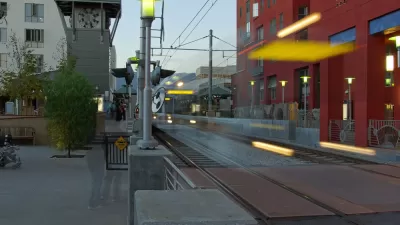For 10 years now, Michael Lejeune, Creative Director for the Metropolitan Transit Authority (M.T.A.), has made taking transit in L.A. seem a lot cooler. These re-branding efforts have contributed to a 38 percent increase in ridership since 2005.
As Los Angeles' car culture flourished, public transit in the city became somewhat of a pariah -- that is, until Michael Lejeune stepped in. Armed with a small legion of writers, photographers and creatives, at 49, Mr. Lejeune "began chipping away at the blind spot he perceived" in how Angelenos thought about public transit, reports Azadeh Ensha. "Unless you had to take public transportation, the majority of people thought that's not for me," said Lejeune in a recent interview.
For Lejeune, giving public transit a face-lift, at least in the public eye, meant making it seem friendlier and even playful, to appeal to more potential riders, says Ensha. He started with a basic name change, "Metropolitan Transit Authority? Oh, please. Just say Go Metro." He also targeted neighborhoods like Crenshaw and West Hollywood, using personalized slogans such as, "Crenshaw just got Rapid" and "Ride with Pride."
"Mr. Lejeune and company are also responsible for the M.T.A.'s billboards, mobile applications, public arts program, television commercials, merchandising and even the office security badges," writes Ensha. They even re-painted white buses into eye-catching reds and "California Poppy" oranges. The results have been astonishing, "with discretionary ridership [rising] 8 percent" after the initial 18 months of advertising, and rail ridership increasing 38 percent since 2005, according to the mayor's office.
So, how does Mr. Lejeune feel about his regular morning commute on the L.A. Gold Line today? "I read and I pay bills and I work and I talk to people," Mr. Lejeune said. "I used to drive two hours a day, so this job is karma for me." It looks like it's good karma for all Angelenos.
FULL STORY: In an Entrenched Car Culture, Painting a Bolder Face on Mass Transit

Maui's Vacation Rental Debate Turns Ugly
Verbal attacks, misinformation campaigns and fistfights plague a high-stakes debate to convert thousands of vacation rentals into long-term housing.

Planetizen Federal Action Tracker
A weekly monitor of how Trump’s orders and actions are impacting planners and planning in America.

In Urban Planning, AI Prompting Could be the New Design Thinking
Creativity has long been key to great urban design. What if we see AI as our new creative partner?

King County Supportive Housing Program Offers Hope for Unhoused Residents
The county is taking a ‘Housing First’ approach that prioritizes getting people into housing, then offering wraparound supportive services.

Researchers Use AI to Get Clearer Picture of US Housing
Analysts are using artificial intelligence to supercharge their research by allowing them to comb through data faster. Though these AI tools can be error prone, they save time and housing researchers are optimistic about the future.

Making Shared Micromobility More Inclusive
Cities and shared mobility system operators can do more to include people with disabilities in planning and operations, per a new report.
Urban Design for Planners 1: Software Tools
This six-course series explores essential urban design concepts using open source software and equips planners with the tools they need to participate fully in the urban design process.
Planning for Universal Design
Learn the tools for implementing Universal Design in planning regulations.
planning NEXT
Appalachian Highlands Housing Partners
Mpact (founded as Rail~Volution)
City of Camden Redevelopment Agency
City of Astoria
City of Portland
City of Laramie




























